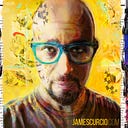Masks of Origin
After its labyrinthine journey through the mists of time — and several dozen revisions — Masks of Origin: Regression in the Service of Omnipotence, Brian George’s first book of essays, is now available through Untimely Books. Each section is also illustrated.
I hope to write a longer review of my own when I’ve had a chance to read it in its final form, but I’ve read several excerpts and versions over the years, certainly well enough to recommend it. You can order a copy here.
JF Martel, author of Reclaiming Art in the Age of Artifice: A Treatise, Critique, and Call to Action:
Blending fantasy and history, fiction and myth, the essays of Brian George read like scripture from a lost civilization or the dream journal of a buried god. Intimate yet strangely universal, this is prose that touches on the very essence of poetry. It wipes away boundaries and liberates forces in the reader and in language itself. Masks of Origin is perhaps best described as a history of our collective soul, as seen through the prism of a singular mind. Surely, George is one of the rare living writers who truly deserve to be called visionary.
Stephanie Wellen Levine, Author of Mystics, Mavericks, and Merrymakers: An Intimate Journey among Hasidic Girls, Columnist at Hevria and The Wisdom Daily:
In Masks of Origin, Brian George will blow your mind and make you see everything — time, space, life, death — in radically new ways. This is a delightful combination of memoir and philosophical journey. The ideas are complex, but the language is easy to follow, creating an experience that is both profound and accessible. The book is filled with personal stories that touch universal truths. I love hearing about mystical experiences and have heard many amazing stories, but Brian’s stand out for their vividness, depth, and engaging, lucid description. If you’re in the mood for a fun and mind-expanding ride, read this book!
Olujide Adebayo-Begun, author of The Book of Supreme Happiness:
George’s work is precisely its own thing: an archaic genre the western world has long forgotten it possessed, a genre I suspect was already defunct to the Western imagination even at the time of Homer. George is a phenomenal pagan, thrown forwards or backwards in time to this era. I will hesitate to call his work poetry, not that it does not more than serve the function of poetry, but his method is one that predates the definitions we have given poetry in modern literary theory. It is primal incantation, a spell, dreaming as vital action. In Yorubaland, the part of Nigeria where I grew up, one of the praise epithets of Aziza (a supernatural being who travels in a tornado) is, “He is the one for whom thought and action are one and the same.”
